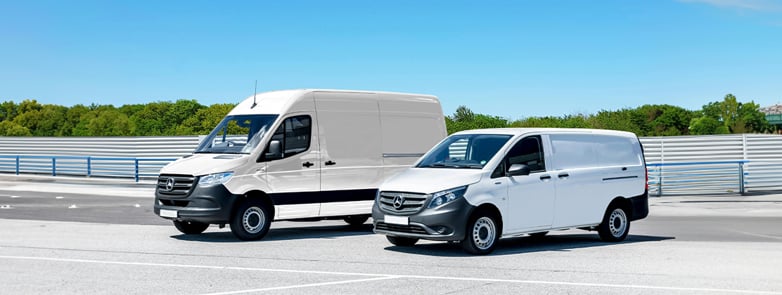Van Payload Checker
Understanding your van’s payload is crucial, especially for those using vans for work purposes. Overloading can lead to costly fines, safety risks, and excessive wear on your vehicle. This guide will explain how to check your van's payload, why it matters, and provide practical tips to ensure you’re always within safe and legal limits. From construction professionals carrying heavy tools to tradespeople transporting materials, managing payload effectively can make a big difference in vehicle performance and operating costs.
Find out more about Van Payloads below.
- What is a Van Payload Checker?
- Why is Checking Your Van's Payload Important?
- How to Check Your Van’s Payload
- Tips for Maximising Your Van's Payload
- Maintenance Tips for High Payload Usage
- What happens if I exceed my van's payload limit?
- How do I find the payload limit of my van?
- Can I increase my van’s payload capacity?

Knowing your vehicle's payload is essential when driving a van. A van payload checker is a tool or calculation method that will help determine the total weight that your van is legally and safely allowed to carry. Knowing how to handle your payload in matters relating either to commercial deliveries or personal errands saves you from considerable fines. It also improves fuel efficiency and prolongs the life of your vehicle.
Using a payload checker for vans, you can ensure your vehicle stays within the legal weight limits, keeping you safe on the road and compliant with UK regulations. This is a basic but important part of van maintenance.
“Understanding your payload is the first step towards safe, efficient driving. It’s not just about avoiding fines; it’s about ensuring vehicle longevity and safety on the road”

Exceeding your van's payload capacity can lead to serious consequences, both legally and in terms of road safety. Overloading a van will result in the rapid wear and tear of some of the major components of the vehicle, like suspension, brakes, and tyres. Eventually resulting in costly repairs and even accidents. From a legal aspect, surpassing the legal van payload limit in the UK can lead to significant fines and penalties, including points on your license.
Using a van payload checker guarantees that drivers stay within the legal weight limits, which helps maintain optimum performance and reduce the risk of accidents. Understanding how to check your van's payload will extend its lifespan and improve fuel efficiency, which is very important for regular business use.
To check your van's payload, you’ll need to know two things:
- Gross Vehicle Weight (GVW): This is the maximum weight your van can safely carry, including the van itself, passengers, fuel, and cargo. You can find the van’s gross vehicle weight on a plate inside the driver’s door frame or in the vehicle’s manual.
- Kerb Weight: This is the weight of your van when it's empty but with all necessary fluids (fuel, oil, etc.) included. It does not include passengers or cargo.
Payload = Gross Vehicle Weight (GVW) – Kerb Weight
This figure will tell you how much weight your van can safely carry. Most vans will have this information on a plate located in the driver's door frame or within the manual.
- Locate GVW and Kerb Weight: Check the van’s door frame plate or manual.
- Use Online Tools: Consider an online payload checker for ease.
GVW and Kerb Weight | What it Means |
GVW | Total allowed weight |
Kerb Weight | Empty van weight |
If you seem to be reaching your payload limit in your van, you will surely want to maximize that weight as much as possible. Below we have listed a few tips that will help you maximize the payload in your van without compromising on safety and efficiency:
- Efficiently Organize Your Cargo: Balance out the weight throughout your van to avoid overloading in one area. Poor weight distribution will impact your handling and increase wear on your tyres and suspension.
- Lighten the Load: Remove unnecessary items or tools from your van. Even small reductions in weight can help you stay within your payload limit and improve fuel efficiency.
- Invest in Lightweight Equipment: Consider upgrading to lighter equipment or materials if possible. Modern, lightweight tools can help reduce the overall load and give you more room for essential items.
- Upgrade to a Larger Van: If your payload needs consistently exceed your van’s capacity, it might be time to consider upgrading to a larger vehicle with a higher Gross Vehicle Weight (GVW). This can help you avoid overloading issues and keep your van within legal limits.
- Regularly Monitor Payload: Use a van payload checker or weighbridge frequently to check the load that your van carries. This can ward off potential possibilities of overloading unintentionally and stay compliant with UK laws.
These tips will help you get the maximum from your van's payload capacity, enhance its safety, and maintain fuel efficiency.
When frequently carrying heavy loads, additional maintenance is essential to avoid excessive wear. Follow these tips to keep your van in optimal condition:
- Tyre Maintenance: Check tyre pressure regularly, as overloaded tyres are more prone to wear.
- Brake Checks: Ensure brakes are in good condition, as they work harder with a heavy load.
- Suspension Care: Inspect suspension components periodically, as they bear most of the weight impact.
- Regular Servicing: Schedule maintenance checks for brakes and suspension.
- Adjust Tyre Pressure: Refer to the manual for recommended pressures for loaded vans.

Exceeding your van's payload limit can have serious consequences. You may face hefty fines, points on your driving licence, or even legal action. Overloading can also lead to mechanical problems, such as damage to your suspension, brakes, and tyres, which increases the risk of accidents. Additionally, your insurance may not cover you if an accident occurs while your van is overloaded.
You can find your van’s payload limit on the manufacturer’s plate, which is typically located in the driver’s door frame or under the bonnet. This will display your van’s Gross Vehicle Weight (GVW) and Kerb Weight, allowing you to calculate the maximum payload. Alternatively, you can check your van’s manual or use an online payload checker.
Legally, you cannot increase your van’s payload capacity without upgrading to a van with a higher Gross Vehicle Weight (GVW). However, you can optimise your current load by reducing unnecessary weight and using lightweight materials or equipment. If you frequently exceed the payload limit, upgrading to a larger vehicle may be the safest and most practical solution.
For more information, check out our Van Leasing FAQs to find answers to our most commonly asked questions about van leasing.
A van payload checker is a simple step to ensure your van is safe, legal, and efficient. Frequently checking your van's payload is legal, you prevent giving in to heavy fines, prolong the life of your vehicle, and even help improve your fuel efficiency. Whether you use your van for business or personal use, understanding the payload of your van is serious business in terms of safety on the road and keeping within the legal limits here in the UK. Follow the tips provided in this guide to maximise your payload effectively and ensure your van performs at its best.
Nationwide Vehicle Contracts are one of the UK's leading vehicle leasing brokers and offers a range of leasing deals to suit every need. To find out more, check out our comprehensive van leasing guides or call one of our experts on 0345 811 9595.
Guide Information
Originally published: 31st October 2024
Last updated: 25th February 2026
